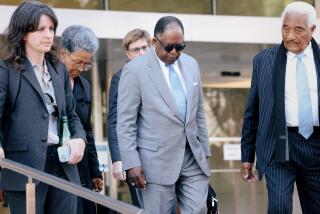Judge Believes Mayor’s Jury Making Progress
- Share via
Saying he believes that the jury in Mayor Roger Hedgecock’s felony retrial is “working hard” and apparently making progress in its deliberations, Superior Court Judge William L. Todd Jr. refused a request Tuesday by defense attorney Oscar Goodman to declare a mistrial.
Todd’s ruling, made in response to Goodman’s concern that jurors might “compromise a verdict” because of the “coercive effect” of being sequestered for six days, came after the judge revealed that the jury sent him a note late Monday asking a question about one of the felony perjury charges facing Hedgecock.
In regard to that question, Deputy Dist. Atty. Charles Wickersham conceded that he neglected to introduce one of Hedgecock’s financial disclosure statements into evidence during the trial--an admission that, for all practical purposes, means that Hedgecock cannot be convicted on one perjury count. The mayor faces 15 felony conspiracy and perjury counts and a single misdemeanor conflict-of-interest charge stemming from alleged illegal personal and campaign financial aid.
At Tuesday’s brief court session, Goodman explained that he requested the meeting because he was “concerned about the length of the deliberations” of the eight-woman, four-man jury. The jurors, who today begin their seventh day of deliberations, have spent nearly 60 hours pondering their verdict, more than twice as long as the jury in Hedgecock’s first trial deliberated last February before Todd declared a mistrial with the jury deadlocked 11-1 in favor of conviction.
Noting that the jury in Hedgecock’s first trial was not sequestered, Goodman told Todd that because the current jurors’ “normal life styles . . . have been interrupted,” he was worried that they might begin to “compromise a verdict” in order to expedite their deliberations. To prevent that from happening, Goodman said, Todd should ask the jurors whether they were making progress and, if he learned that the jurors were deadlocked, declare a mistrial.
Wickersham, however, warned that Todd could “jeopardize the product” of the jurors’ deliberations by approaching them “without their request,” arguing that such an inquiry could put artificial pressure on the jurors to conclude quickly.
“Anything that (Todd) says to them has the serious risk of giving them a false signal,” Wickersham explained. “And I don’t want to give them any kind of a signal.”
Siding with Wickersham, Todd characterized the note that he received from the jurors on Monday as “an indication of a hard-working jury” that is still sifting through the evidence, and not at an impasse.
“They’re working long hours, no question about it,” Todd said.
Even Goodman conceded that the note undermined his request for a mistrial by showing that the jurors “are conscientiously deliberating without knocking each other over the head.”
The jurors’ note concerned a perjury count alleging that Hedgecock intentionally falsified an amended Statement of Economic Interest covering Jan. 1, 1983, through May 19, 1983, by omitting his receipt of monthly interest payments from a deed of trust that he had sold to former J. David & Co. principal Nancy Hoover in late 1982.
Although Hedgecock sold Hoover the $16,000 note in December, 1982, he asked her attorney to delay recording the sale until June, 1983--a delay that prosecutors suggest was designed to conceal his ties to Hoover until after the special May, 1983, mayoral race. Hoover also agreed to allow Hedgecock, who says the delay was for tax purposes, to continue receiving the approximately $110 monthly interest payments on the note during the six-month period between the sale and the time it was to be reported.
In his closing argument last week, Wickersham hinted that he may have forgotten to introduce Hedgecock’s amended financial disclosure statement covering the early 1983 period in which those interest payments should have been listed.
In an attempt to clarify the situation, the jurors sent Todd a note that read: “Please confirm the failure to admit the amended statement in count 13.” After Wickersham admitted that he had, in fact, not introduced the particular finance report, the prosecutor suggested that Todd instruct the jury that Hedgecock could not be convicted on the count.
Goodman, however, surprised even Todd by saying that he did not want the judge to deliver such an instruction to the jury. Rather, Goodman asked that Todd respond to the jurors’ note by simply confirming that the finance report had not been introduced as evidence. After confirming that Hedgecock agreed with his attorney’s advice, Todd agreed to take that approach.
More to Read
Sign up for Essential California
The most important California stories and recommendations in your inbox every morning.
You may occasionally receive promotional content from the Los Angeles Times.













